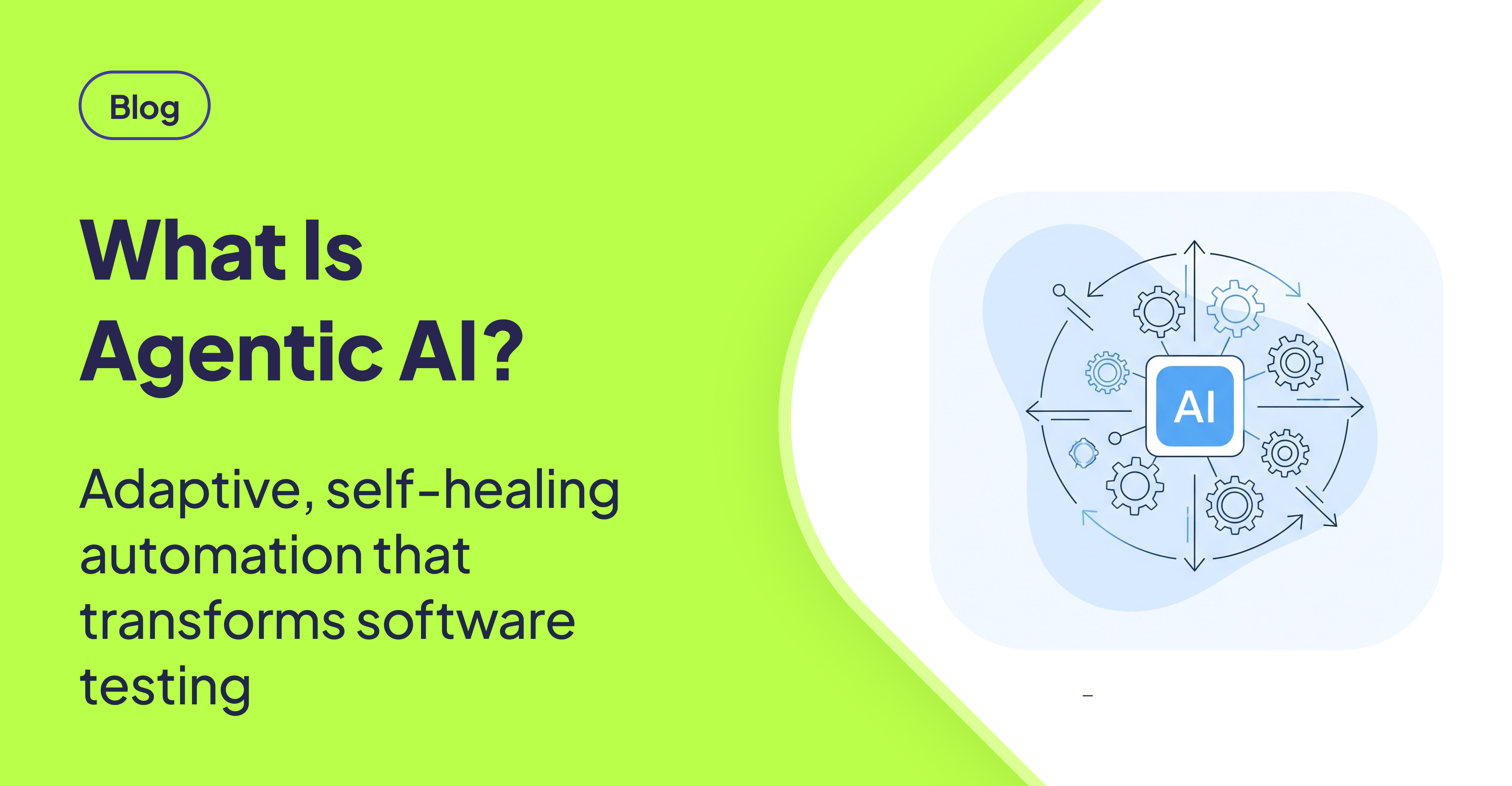TLDR
Agentic AI solves the challenges of brittle test automation by using goal-directed behavior, visual reasoning, and self-healing to adapt to UI changes. This allows for the creation of stable tests that evolve with applications, reducing flakiness, maintenance costs, and empowering QA teams to focus on improving product quality.
Introduction
Why do most test automation efforts falter as applications evolve? The answer lies in the static nature of traditional scripts that fail to adapt to dynamic user interfaces. Agentic AI offers a solution: adaptive, self-healing automation that maintains QA stability despite frequent product changes. For QA Managers, Test Engineers, and Automation Leaders, Agentic AI translates to fewer brittle scripts, reduced test flakiness, and accelerated regression cycles.
What is Agentic AI?
Agentic AI encompasses autonomous systems capable of perceiving, reasoning, deciding, and acting based on defined goals, rather than relying on rigid scripts. It mirrors the capabilities of human testers who understand intent, not just element selectors. [STAT: According to a recent report, the global AI in the testing market is expected to reach $1.2 billion by 2027, highlighting the increasing demand for intelligent automation solutions.]
Core Capabilities of Agentic AI
Agentic AI offers several crucial capabilities that address the limitations of traditional automation:
- Goal-Directed Behavior: Executes tasks based on desired outcomes, ensuring tests align with intended functionality.
- Real-Time Decision-Making: Adapts to unexpected UI changes, preventing test failures due to minor modifications.
- Failure Recovery: Self-corrects during test failures, minimizing the need for manual intervention and maximizing test efficiency.
- Dynamic Adaptation: Handles UI modifications without human intervention, maintaining test stability as the application evolves.
The Power of Agentic AI in Test Automation
Unlike traditional automation, which relies on brittle, hard-coded selectors, Agentic AI leverages:
- Visual Reasoning: Recognizes UI elements visually, mimicking human perception and improving accuracy. [STAT: Visual AI is improving UI recognition rates by an average of 40% compared to traditional methods.]
- Semantic Understanding: Interprets the functional intent of UI elements, enabling tests to understand the "why" behind actions.
- Natural Language Test Authoring: Allows tests to be written in plain English, simplifying test creation and making it accessible to non-technical users.
- Autonomous Recovery: Adjusts test flows dynamically as application conditions change, ensuring tests remain functional even when unexpected issues arise.
- Self-Healing Capabilities: Automatically updates element locators, reducing maintenance overhead and improving test resilience. [STAT: Self-healing automation can reduce test maintenance by up to 70%, according to industry reports.]
A Practical Example: Adapting to UI Changes
Consider a scenario where a button label changes from "Submit" to "Sign In" after a product update:
- Traditional Automation: The test fails because the selector no longer matches the updated label.
- Agentic AI: Recognizes the button's purpose (login submission), adapts to the new label, and successfully completes the test without human intervention.
Agentic AI vs. Traditional Test Automation
| Traditional Automation | Agentic AI |
|---|---|
| Static scripts | Goal-directed behavior |
| Fixed selectors | Visual reasoning |
| Breaks on minor UI changes | Adaptive recovery |
| High maintenance | Self-healing tests |
| Limited context awareness | Semantic understanding |
| Frequent failures | Stable test execution |
Agentic AI addresses the shortcomings of traditional automation by providing adaptive, resilient, and scalable testing solutions. [STAT: Studies show that traditional test automation fails in approximately 50% of cases due to UI changes and other environmental factors.]
The Tangible Benefits of Agentic AI
Adopting Agentic AI in test automation yields a multitude of benefits:
- Reduced Flakiness: Tests become resilient to UI changes and network delays, leading to more reliable results.
- Faster Test Creation: The need for extensive scripting diminishes, accelerating test creation and increasing coverage. [STAT: Agentic AI can reduce test creation time by up to 60% through natural language authoring.]
- Lower Maintenance Costs: Self-healing automation reduces the burden of manual maintenance, freeing up valuable resources.
- Expanded Test Coverage: Agentic AI can handle dynamic, multi-platform scenarios, leading to more comprehensive testing.
- Non-Technical Accessibility: Empowers non-coders to contribute to QA, democratizing the testing process.
Conclusion
In the era of rapidly evolving software across diverse devices, platforms, and versions, static scripts are no longer sufficient. Agentic AI provides the intelligent, resilient, and scalable automation necessary to keep pace. By minimizing flaky tests, reducing maintenance costs, and allowing QA teams to focus on product quality, Agentic AI transforms test automation into a long-term, future-proof strategy.
FAQ
How is Agentic AI different from traditional AI in testing?
Regular AI often relies on pattern recognition or ML-based element detection. Agentic AI elevates this by incorporating real-time reasoning, autonomous recovery, and adaptive decision-making, resulting in enhanced test stability and resilience.
Can Agentic AI be used for mobile testing?
Yes, Agentic AI excels in mobile QA by effectively handling gesture-based inputs, addressing device fragmentation, and adapting to frequent UI changes inherent in mobile applications. [STAT: Mobile app testing accounts for approximately 35% of all software testing efforts, and Agentic AI can significantly streamline this process.]
Does Agentic AI integrate with CI/CD pipelines?
Absolutely. Platforms like AskUI provide native APIs, CLI tools, and integrations, enabling seamless integration with CI/CD workflows and accelerating the software development lifecycle. [STAT: Integrating AI-powered testing into CI/CD pipelines can accelerate release cycles by up to 25%.]
How does Agentic AI revolutionize test automation compared to traditional methods?
It replaces brittle scripts with adaptive, goal-directed automation, reducing flakiness, lowering maintenance, and increasing test coverage even as applications evolve rapidly.
What are some key use cases where Agentic AI truly shines?
Agentic AI excels in scenarios involving dynamic UIs, frequent application updates, complex workflows, and cross-platform testing. Its ability to adapt and self-heal makes it particularly valuable in agile development environments.
